#i'd say that six episodes only means one major arc in which he is a key feature
Explore tagged Tumblr posts
Text
i've been sitting on this for a while but my current theory is that lou/tommy's going to be in 6-10 episodes this season. i've always likened him to being similar to other longterm love interests, karen and taylor specifically, and those love interests seem to feature in about a third of the episodes per season (unless it's a truncated season, in which case they feature in a little over a half of the eps):
season one, karen was in 4/10 episodes
season two, karen was in 6/18 episodes and taylor was in 2/18
season three, karen was in 10/18 episodes.
season four, karen was in 6/14 episodes and taylor was in 4/14
season five, karen was in 7/18 episodes and taylor was in 13/18
season six, karen was in 6/18 episodes and taylor was 1/18 (but she was no longer a love interest at that time
season seven, karen was in 6/10 episodes
season five was obviously the outlier, as taylor was around for almost all the eps. but 6-10 feels like the safe number of eps we can anticipate, with six being on the low, average end and ten being on the high end. obligatory disclaimer: i don't know anything, and this is just speculation on my part. all of it will come down to their/his contractual agreement(s) either way. but i trust numbers and this is where i personally would place my bets
#if i wanted to get REALLY specific with my predictions#i'd say that six episodes only means one major arc in which he is a key feature#and that would be a bucktommy arc. tim usually resolves arcs in 3-4 episodes and wouldnt waste that time on just tommy#but if it's ten episodes he ends up being in#that means we could get a bucktommy arc AND a solo tommy arc#which would be sexy#tv: 911#jack.txt#911 spoilers#tommy kinard
44 notes
·
View notes
Text
How She-Ra, Wrong Hordak, and I Deconverted in Six Steps
Alright y'all, it's time for my fourth essay exploring how She-Ra and the Princess of Power (SPOP) used Christian themes and parallels to provide a humanist message.
My first post named 9 major messages of SPOP that contradict Christian fundamentalism.
My second gave the historical context of how our generation and Noelle's are growing up to overthrow Christian fundamentalism after it became such a powerful enemy in the U.S.
My third discussed the parallel between Horde Prime’s rage at Hordak’s self-naming and the Christian idea that everyone is an instrument of God’s will.
Now I want to discuss how Adora's and Wrong Hordak's journeys defections from the Horde parallel my story, and potentially others', of leaving Christianity. Adora and Wrong Hordak experience many of the same stages in his journey out of the Horde as many ex-Christians experience leaving Christianity.
My own experience leaving Christianity was a journey into atheism, so I will interpret Adora's and Wrong Hordak's stories through that lens. Plenty of people who left toxic/conservative Christianity behind still believe in God, in heaven, and/or in the value of Christian communities. I do not want to minimize or dismiss their experiences, and I welcome progressive Christians as allies in the fight for LGBT+ rights and social justice generally. But when I watched Adora and Wrong Hordak leave their belief in The Horde behind, I saw myself leaving Christianity behind. I want to tell my story through/alongside theirs. I hope some of you can relate, but it is okay if you cannot, regardless of your religious beliefs or lack thereof.
Deconversion in Fast-Forward
Adora, Wrong Hordak, and I escaped from the organizations that raised us and its worldview in six somewhat-distinct stages:
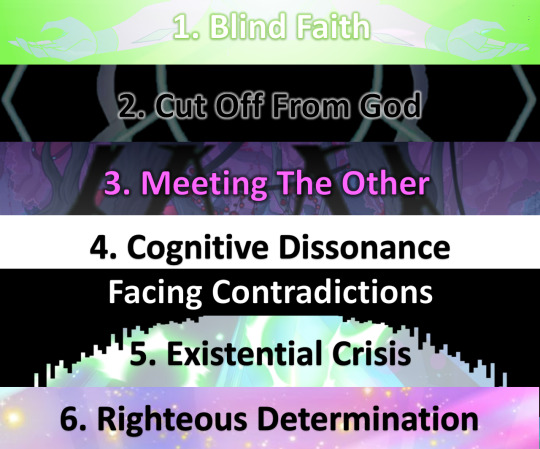
Multiple major characters' arcs in She-Ra begin with rethinking their loyalty to The Horde. Wrong Hordak and Adora both lose their faith in The Horde after a lifetime of indoctrination into its ideals and goals. Their journey away from The Horde mirrors many young Americans' away from Christianity, with at least one notable exception: time. Deconversion takes multiple years for most ex-Christians, but only takes a few days for Adora and Wrong Hordak. Their de-conversion basically represents a speed run of most ex-Christians'.
Full Breakdown of Each Stage
(tw: mention of depression and suicidal ideation)
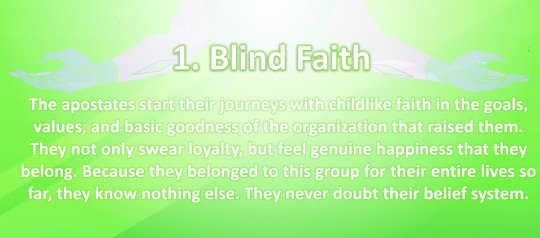
Adora takes delight in pretending to beat up an imaginary princess in the show's first scene, and later calls princesses "violent instigators who don't even know how to control their powers." She believes in the ideals of The Horde, and feels excited to rise through the ranks to become Force Captain. Obedience to Horde authorities comes fairly naturally to her, and she even chides Catra for being "disrespectful."
Wrong Hordak consistently repeats his loyalty to Horde Prime throughout his first episode and beyond. Even while being attacked by his fellow clones, Wrong Hordak affirms that "We serve Horde Prime's will." Unprompted in the next episode he happily announces, "I believe in Horde Prime!"
I felt proud, as a kid in Sunday School, that I could answer more questions about the Bible than any of the other kids. My church's youth group was the most enjoyable part of my middle school years especially because I got to hang out with the guy I only recently realized I'd had a huge gay crush on. I started viewing "feeling happy" and "feeling the presence of God" as identical. I wrote in my 2011 "Faith Statement" for my church's Confirmation that "I fell in love with God," and that "I thank God that I was born into a good Christian family and was raised to honor God."
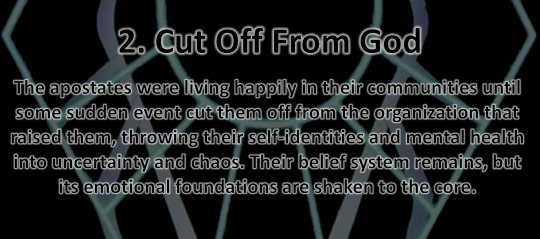
Adora is kidnapped by the Horde's enemies and taken away from her home, separated from all of the voices reassuring her that The Horde is a good organization with a just mission. Shadow Weaver is not around to give her orders or map out her future anymore, leaving her alone with her enemies and her thoughts.
Wrong Hordak's connection to the hive-mind he knew for all of his life is severed. "I am…alone?" he asks in shock, then breaks down and cries, "I am alone!" For someone who grew up living in the same mind as his entire communal "family," suddenly losing that connection to everyone he knew would be traumatizingly shocking. The best equivalent I can think of in human experience is being suddenly ripped away from your family and community and then never seeing them again.
I kept conflating happiness with my faith in God for years, even after my crush moving away drove me into suicidal ideation for a couple weeks in 2011. My mental health recovered for a year before settling into a long-term depression in 2012. Because I conflated happiness with the presence of God, my depression felt like something had taken away the presence of God.

Adora defends the organization that raised her by quoting her highest authority: "Hordak says we're doing what's best for Etheria. We're trying to make things better. More orderly." Glimmer argues against Adora's worldview by showing her (1) that princesses are just people instead of dangerous violent monsters, and (2) what The Horde has done: first the ruins of a village destroyed by The Horde, and then that the village of Thaymor which she was told to attack was peaceful, innocent, and happy.
Wrong Hordak grabs Entrapta by the hair for the crime of "trespassing," and enjoys saying, "Prime shall hear of this, and his punishment shall be merciless." But once Bow’s arrow disconnects him from the Horde’s hivemind, he is simultaneously stranded away from the people who constantly reinforced his belief in Horde Prime’s goodness and stuck with a group of people opposing Prime. For a long time, Wrong Hordak simply pretends that the Best Friend Squad™ serve Horde Prime just like everyone else he ever knew. Every line of his dialogue in “Taking Control” is a quick, snappy motto he took from Horde propaganda, like “I believe…in Horde Prime” and “True nourishment comes from the favor of Horde Prime.” [see footnote 1]
I was well aware, growing up in a progressive suburb, that plenty of my high school friends were nonreligious. After my depression sunk in, I found myself arguing about religion with a brilliant but very smug British friend who consistently refuted my arguments in ways I could not dispute. Searching for arguments to support my pre-existing beliefs, I started reading Christian apologetics, but found nothing my friends could not easily refute. [see footnote 2]
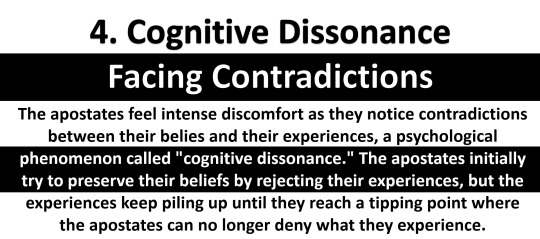
Adora sees the ruins of the site of a Horde attack while with Glimmer and Bow, and at first rejects what Glimmer tells her about what she sees to preserve her worldview: "This doesn't make any sense. The Horde would never do something like this…You don't know them like I do." But when she sees The Horde attack Thaymor, the belief system painstakingly constructed by The Horde and drilled into her over 15 (or so) years comes crashing down. At first she can rationalize away her experiences to preserve her beliefs, but when the evidence of her own senses becomes overwhelming she cannot resolve the cognitive dissonance between her belief in The Horde's goodness and her direct experience of The Horde attacking the innocent town of Thaymor. Her worldview cannot explain what she experienced.
Wrong Hordak keeps his belief in Horde Prime's all-powerful nature for a long time after joining the Best Friend Squad. However, when until the Best Friend Squad catches him in a contradiction. He tells them what he was told: that Krytis does not exist. As soon as they start questioning the contradiction he was fed, he becomes extremely uncomfortable. He maintains his denial of Krytis' existence even after they land on the planet, until he can no longer deny the evidence that Horde Prime is not all-powerful.
I grew up, like many of you, on the Internet. My depression began during the heyday of the online atheist movement—and by “heyday,” I mean “seemingly inescapable presence,” especially on YouTube where I hung out. I kept running into comments asking questions that I could not answer: Why does Christianity seem to promote belief based on internal feelings instead of observable evidence? Why would an all-loving god send anyone to hell forever? Why did I believe claims from Christian doctrine and doubt claims from every other religion? Why has Christianity seemed to cling to the past instead of embracing a progressive future? The questions overwhelmed me. I found myself terrified of my own growing doubts. Eventually, my belief was based entirely on two emotions: nostalgia for past happy experiences I associated with Christianity, and a fear of losing the vague hope those experiences gave me.
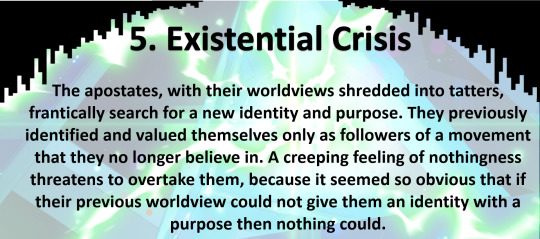
The first time that Bow and Glimmer met Adora, they immediately labeled her “Horde soldier!,” and the label stuck through the first three episodes. Adora has always identified herself primarily as a soldier serving The Horde, echoing the messages she has heard for her whole life: “Shadow Weaver said it didn't matter who I was before, that—that I was nothing before Hordak took me in.” The language of “I was nothing” reflects cult dynamics where a group tries to retain someone permanently by making them think of themself as nothing more than their worshipful loyalty to the group. Similarly, it is a common Christian belief that “without Jesus we are nothing.”
After realizing that Horde Prime fes him lies, Wrong Hordak collapsed into a sobbing mess. “Who am I if not an exalted brother of Prime?,” he bawled, still thinking that the only legitimate kind of identity is one based on fully devoted worship of an all-powerful authority. Per Entrapta, “It seem[ed] that Wrong Hordak has begun to question the meaning of life.” She later described Wrong Hordak’s breakdown as an “existential crisis,” which happens “when individuals question whether their lives have meaning, purpose, or value, and are negatively impacted by the contemplation.” Without an all-powerful father figure to value him, Wrong Hordak thought, who would?
I identified myself fundamentally as a Christian for my entire childhood and teen years. I found joy, purpose, and a sense of self in my religion. Leaving my religion behind felt like burning the bridge to who I was behind me. When I de-converted from Christianity, I felt like I was standing at the brink of a void. I thought that without finding goodness in God, I might find no goodness at all. [see footnote 3]
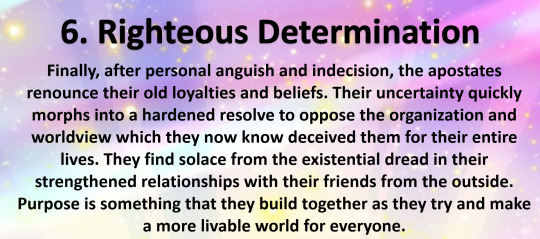
When Wrong Hordak finishes (digitally, but also emotionally) processing the Krytis data logs of Horde Prime leaving in defeat, he explicitly renounces his old loyalties and declares his opposition to the organization and beliefs that he used to believe in with all his heart: "Brothers! Horde Prime lied to us. He is a false ruler. We must rise up against him, and free the universe from his unjust reign!"
After Adora betrays the Horde at the Battle of Thaymor, she pledges her loyalty to Bright Moon in her battle against the Horde: "I’ve seen for myself the atrocities the Horde has committed against the people of Etheria, and I’m ready to fight to stop them. If you give me the chance, I know I can help the Rebellion turn the tide of the war."
I didn't have an explicit declaration statement like Wrong Hordak or Adora. However, on 5/5/15 I arranged a meeting with my very friendly and understanding youth pastor as a last-ditch effort to save my faith. I hoped that he would crush my worrying doubts. Instead, actually encouraged me to become agnostic and to look into non-Christian beliefs on the subject of religion. Rather than feeling terrified of what I might find and wishing that someone could indoctrinate me into my old belief system, I started on a path to discover the truth wherever it might lead me.
Footnotes for Context
Christian fundamentalists’ similarly simplistic snappy phrases have been labeled by ex-Christians as “thought-terminating clichés… brief, highly reductive, definitive-sounding phrases” where “Simple labels are attached to something you like or dislike, and they are the start and finish of all thought on the subject.” Such black-and-white “totalistic” thinking is common in Christian fundamentalism, especially how it labels complex political topics as somehow being merely a cover for “spiritual warfare” between the totally good/Godly side and the totally evil/demonic side.
Specifically, I started reading an “Intelligent Design” propaganda apologetics book by Lee Strobel called The Case For A Creator. A self-proclaimed former atheist, Strobel wrote his The Case For series using my same research strategy: Only do research using sources that already agree with you. Whereas Strobel exclusively talked to other Christian apologists, though, I at least tried talking to atheists. Anyway, I walked into school one day with a confident smile and a copy of Strobel’s book and sat down with some friends. One of them, another brilliant atheist but with a far subtler and humbler personality, noticed it and his face immediately sunk into the expression of someone exhausted by the topic as he braced himself for my bullshit. When I confidently asserted a creationist talking point trying to dismiss the findings of some old experiment, he not only knew the experiment but immediately dismantled my talking point. I had no reply. What struck me most was not just his swift rebuttal, but his weary tone: My arguments were not only bad, but so bad that he was genuinely tired of them.
Around the same time, I became obsessed with the character of Kefka from Final Fantasy 6. To me, Kefka represented what I feared most about leaving Christianity behind — that I would lose any sense of meaning, purpose, or morality in my life. ("Life… Dreams… Hope…Where do they come from? And where are they headed? Such meaningless things!") Edgy, I know, but in my mind that kind of absurdism seemed to be an inevitable result of abandoning my religious beliefs. Fortunately, I came to understand that there is plenty of meaning, purpose, beauty, and goodness outside of the particular religion that I happened to be born into.
#she-ra#spop#she-ra spoilers#spop spoilers#religion#christianity#long post#...#about me#religious meta
37 notes
·
View notes
Note
I'd love to hear more of your thoughts re: 23, how Chris' artistic choices were mistaken for apathy. I apologize if you go into this in your meta (which I didn't realize you were finished with and I'm SUPER excited to jump into!) -- clearly you're acknowledging that there is some sort of shift in Kurt's character. I think he's noticeably not as into the "Klaine" relationship and I just assumed it was because Chris was over Glee at that point. What do you think?
Okay - so yeah, I do get into it within the meta - so if you want super specifics - it’s there. You think a scene looks off? Go check what I have to say - cause I’m sure I’ve tried to hit every complaint.
So - first of all, though, I need to say this - there’s this habit of -- hey this scene isn’t the be all and end all of everything I wanted it to be -- especially after I’ve been spoiled about it. And I do think /that/ plays into it.
And yes, I do think Chris was getting tired of the show, but so was everyone else. And I feel like it’s disingenuous to saddle him as being the one checked out when I think everyone had their moments - especially the last few seasons after they’re all dealing with the tragic early death of a friend and coworker. But I also think once an actor says admits that (and Chris did) -- people jump on to every little thing not quite up to their personal standards and declares that it’s Chris not being into it.
And quite frankly - it does frustrate me a little bit. Cause no other actor gets as much scrutiny for it, and I really don’t think that it’s fair -- especially when there were other actors who had lackluster moments, too...
I also think that, as a fandom, we micro-analyze these scenes and sometimes forget the bigger picture of what’s going on -- and we did that especially in season 5 when we weren’t sure what was going on with season 6, and I feel like once we have the whole picture - a lot of Chris’s acting choices actually make more sense (to me).
I also believe Chris is professional enough to do his job, too...
There is another huge thing I’d like to point out -- Darren, when talking about his time on Versace, mentioned that a lot of time, performances are shaped by directing and editing - and when he watched Versace, he felt like there pieces missing (cause they had to cut them out) and that some of his process wasn’t shone.
And that clicked with me. An actor’s performance is only one part of it. There’s direction - what the actors are specifically /told/ to do, and then editing - where other people piece together what we see and create a performance out of what they’re given. And I think a lot of times - things were edited together weirdly, tbh. But I think it’s important to remember that someone’s acting/performance isn’t the full picture - and that there are other factors that go into creating a show.
That said -- some specifics...
I haven’t heard of many complaints about Chris’s acting until the end of season 4 - if there’s another, earlier moment you’d like to know more about, I’d suggest checking the meta. I probably won’t get into this again because people get super wanky easily over this - and I’m just a little tired of it, tbh.
1. The Lesbian/Breadstix scene of All or Nothing (4x22) - So. First of all, this is an editing issue more than a performance issue. If you look at a lot of the over the shoulder shots, or shots when Kurt’s very off to the side - you can see him smiling happily at Blaine. Kurt wasn’t dismissive of Blaine at all - but because of the editing wanting to keep Kurt’s inner thoughts more of a mystery (because of the ending cliffhanger) they didn’t show the times when Kurt seemed to be having a good time. Plus - they’re with strangers, and Kurt isn’t exactly the most open person when people he doesn’t know. Plus also - the point of this scene isn’t about Klaine’s relationship, it’s about LGTB rights and the lesbians getting engaged.
I know I go on about this scene in the meta - so I do suggest you check that out for more details.
2. In Love Love Love, Chris’s acting is spot on - and I see absolutely zero issues. He’s completely checked in and plays Kurt masterfully here. People don’t complain about LLL - I’m just bringing it up because I feel like that Chris hits the major Klaine moments out of the ballpark every time.
3. Movin’ Out - in general there was grumbling about the Klaine stuff, but again, I don’t see the issue. Their one real scene together was awkwardly staged, but I see no issue with the acting in the scene. And it’s not Chris’s fault there wasn’t a scripted kiss there. **shrugs**
4. Mid-season 5 - did people have problems with Kurt’s acting during this? Did people notice? I feel like people only seem to have issues when it’s directly connected to Blaine, and that doesn’t feel fair.
My only issue with Puppet Master is that they didn’t have a final scene for Klaine to reconnect and be over the conflict - but Glee is bad about those kind of things.
Other than that... ??
I personally have an issue with Previously Unaired Christmas, but only because they never wrote Kurt to be that flirty and up on Blaine. That’s not Chris’s fault either.
5. The New York Arc - So, for detailed info, I really suggest the meta, cause I go super into Kurt’s headspace and defend Chris’s choices here a lot. the tl;dr version --
Kurt’s not in a good place in general - partly cause of Finn’s death, partly cause he’s not ready to be married, partly because he’s constantly surrounded by an onslaught of people who are very much about them, partly cause he feels like his career isn’t going anywhere. Kurt’s in a sad place through most of the arc - which leads to the break up.
Kurt’s far more irritated and annoyed by Rachel than he ever is with Blaine throughout the arc
When Kurt was supposed to be happy with Blaine he was -- and I didn’t see any issues with Chris’s acting there.
I know people have issues with the end of Tested - but that was definitely acting choice/direction over performance/actor bleed - and I go way into in the meta.
I find there’s only one real bad Klaine scene - and that’s their first scene in the Back Up Plan - but its a) a badly written scene and b) It’s Darren whom I find off in it, tbh.
I do agree that we should have seen more downtime/happier moments to balance out the drama - glee’s writers dropped the ball on that.
And -- in season 3 we were used to the background moments of Klaine because that’s all we got... but now they’re front and center, we didn’t get background moments the same way. Personally, I prefer the story and the conflict and the growth, and while yes, I think we could have used some more minor moments, I don’t think we got nothing? Nor do I think Chris was purposely pulling away in what we did see - or least in my own interpretation.
6. I have zero issues with season six Kurt. Chris totally knocked the whole thing out of the park, so I have no idea what people’s issues are during that season. I mean - I kinda understand the lack of feeling married post the Wedding episode - but that was due to the story telling issues and the show not focusing on them as characters /at all/. I think the finale was fine?
7. As for Kurt, the character, not seeming as invested in Blaine?? Ug - Kurt loves Blaine. It’s there, I promise, it really is. There’s never an instance in the show where I thought - huh, Kurt seems like he doesn’t love Blaine anymore. Not even during the break ups. Whether you believe Chris’s acting choices were valid or not - the writing was always there when it came to Kurt loving Blaine. And yeah, I’d have loved to have seen more of it. But it is there... I spend most of my meta analyzing time talking about it, lol.
Do I think Chris was 100% on all the time? No - but no actor is. But I ultimately think that most of the bigger complaints I’ve seen over the years are more from purposeful acting choices during season 5 than Chris being unprofessional. Hey - if you just don’t see it that way, that’s fine, I’m not going to try to convince you otherwise. But I really do wish people would go back and watch the full thing with an open mind before outright dismissing or judging it.
**shrugs**
#that's how s.o. sees it#hopefully that at least sheds light on my view point?#also dear - some of my snarky-ness is not at you specifically but at this argument I see all the time... mostly from blaine/darren fans#ruiny0ursleep
24 notes
·
View notes